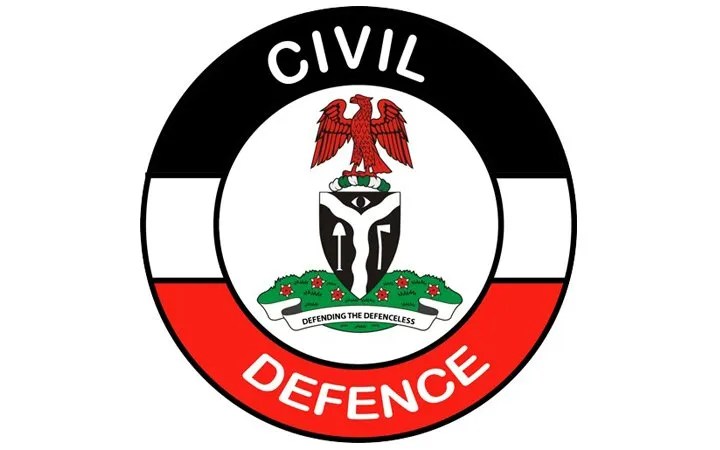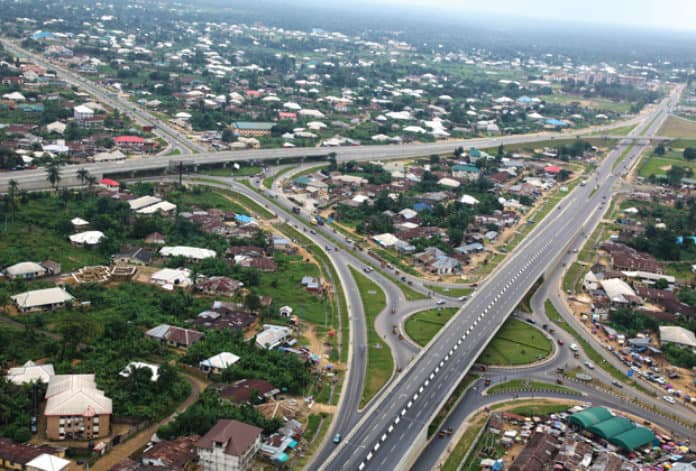
The Nigeria Security and Civil Defence Corps (NSCDC) is a paramilitary organization established in May 1967 by the Federal Republic of Nigeria, with the mandate of protecting lives and properties, as well as maintaining peace and order in the country. The NSCDC is one of the 18 paramilitary organizations in Nigeria and is charged with the responsibility of preventing and combating civil disturbances, pipelines vandalism, oil theft, and other criminal activities.
The NSCDC operates under the Federal Ministry of Interior and is headed by a Commandant-General who is appointed by the President of Nigeria. The organization is divided into several departments, including the Administration and Finance Department, Operations Department, and Intelligence and Investigation Department.
As a paramilitary body, the Civil defence is responsible for the protection of critical national infrastructure such as oil pipelines, refineries, power stations, and other public facilities. They also collaborate with other security agencies to ensure the safety and security of citizens during national events such as elections and major festivals, which therefore increases their responsibilities, hence the need for more hands on the job which calls for recruitments.
The training academy of the Civil defence located in Sauka, Abuja, where personnel are trained in various aspects of security, including weapon handling, physical fitness, and intelligence gathering. The organization also collaborates with international security agencies to improve its effectiveness in safeguarding Nigeria’s security and interests.
NSCDC is an important organization in Nigeria’s security architecture, charged with the responsibility of maintaining peace and security, protecting critical national infrastructure, disaster management, and other related duties.
Having harped succinctly on what you need to know about the formation of the Civil defence, for the purpose of this article, I will be furnishing you with the followings;
- The Civil defence ranks and structure
- The NSCDC (Civil defence) salary structure
- The requirements for applying for Civil defence
The Civil defence Ranks and Responsibilities
The Nigeria Security and Civil Defence Corps (NSCDC) has a hierarchical structure that is based on ranks. The ranks in the NSCDC, from the highest to the lowest, are as follows:
- Commandant-General (CG)
- Deputy Commandant-General (DCG)
- Assistant Commandant-General (ACG)
- Commandant (Cdt)
- Deputy Commandant (DCdt)
- Assistant Commandant (ACdt)
- Chief Superintendent (CSP)
- Superintendent (SP)
- Deputy Superintendent (DSP)
- Assistant Superintendent I (ASI)
- Assistant Superintendent II (ASI)
- Inspectorate Cadre
To further understand the various ranks and their responsibilities, I have given a brief description of each below.
1. Commandant-General (CG):
The Commandant-General (CG) is the highest rank in the Nigeria Security and Civil Defence Corps (NSCDC). The Commandant-General is the head of the organization and is responsible for the overall management and administration of the Corps.
Some key specific responsibilities of the Commandant-General include:
- Formulating policies and strategies for the organization’s efficient and effective functioning.
- Ensuring the effective implementation of policies and programs aimed at enhancing the NSCDC’s mandate of safeguarding lives and properties.
- Representing the NSCDC at national and international events and forums.
- Coordinating the activities of the NSCDC with other security agencies to maintain law and order in the country.
- Providing leadership and direction to officers and men of the NSCDC to ensure they carry out their duties effectively.
- Deputy Commandant-General (DCG):
The Deputy Commandant-General (DCG) is the second-highest rank in the Nigeria Security and Civil Defence Corps (NSCDC) and assists the Commandant-General in the management and administration of the Corps.
The Deputy Commandant-General has a broad range of responsibilities, including:
- Assisting the Commandant-General in formulating policies and strategies for the efficient and effective functioning of the organization.
- Acting on behalf of the Commandant-General in his or her absence or when delegated.
- Supervising and coordinating the activities of departments and units in the organization.
- Ensuring the effective implementation of policies and programs aimed at enhancing the NSCDC’s mandate of safeguarding lives and properties.
- Representing the NSCDC at national and international events and forums as directed by the Commandant-General.
- Providing leadership and direction to officers and men of the NSCDC to ensure they carry out their duties effectively.
3. Assistant Commandant-General (ACG):
The Assistant Commandant-General (ACG) is the third-highest rank in the Nigeria Security and Civil Defence Corps (NSCDC) and assists the Commandant-General and Deputy Commandant-General in the management and administration of the Corps.
The Assistant Commandant-General has a range of responsibilities, including:
- Assisting the Commandant-General and Deputy Commandant-General in formulating policies and strategies for the efficient and effective functioning of the organization.
- Supervising and coordinating the activities of departments and units in the organization.
- Ensuring the effective implementation of policies and programs aimed at enhancing the NSCDC’s mandate of safeguarding lives and properties.
- Representing the NSCDC at national and international events and forums as directed by the Commandant-General.
4. Commandant (Cdt):
The Commandant (Cdt) is a senior management rank in the Nigeria Security and Civil Defence Corps (NSCDC). Commandants are responsible for the management and supervision of operational units in the organization.
Some of the specific responsibilities of the Commandant include:
- Supervising and managing the activities of operational units in the organization.
- Ensuring the effective implementation of policies and programs aimed at enhancing the NSCDC’s mandate of safeguarding lives and properties.
- Representing the NSCDC at events and forums as directed by the higher authorities.
- Providing leadership and direction to officers and men of the NSCDC to ensure they carry out their duties effectively.
5. Deputy Commandant (DCdt):
The Deputy Commandant (DCdt) is a mid-level management rank in the Nigeria Security and Civil Defence Corps (NSCDC) and assists the Commandant in the management and supervision of operational units in the organization.
The key responsibilities of the Deputy Commandant include:
- Assisting the Commandant in supervising and managing the activities of operational units in the organization.
- Ensuring the effective implementation of policies and programs aimed at enhancing the NSCDC’s mandate of safeguarding lives and properties.
- Representing the NSCDC at events and forums as directed by the higher authorities.
- Providing leadership and direction to officers and men of the NSCDC to ensure they carry out their duties effectively.
- Ensuring the training and capacity building of NSCDC personnel to enhance their skills and competence in safeguarding lives and properties.
6. Assistant Commandant (ACdt):
The Assistant Commandant (ACdt) is a junior management rank in the Nigeria Security and Civil Defence Corps (NSCDC) and assists the Deputy Commandant in the management and supervision of operational units in the organization.
Some responsibilities of the Assistant Commandant include:
- Assisting the Deputy Commandant in supervising and managing the activities of operational units in the organization.
- Ensuring the effective implementation of policies and programs aimed at enhancing the NSCDC’s mandate of safeguarding lives and properties.
- Representing the NSCDC at events and forums as directed by the higher authorities.
- Providing leadership and direction to officers and men of the NSCDC to ensure they carry out their duties effectively.
- Ensuring the training and capacity building of NSCDC personnel to enhance their skills and competence in safeguarding lives and properties.
7. Chief Superintendent (CSP):
The Chief Superintendent (CSP) is a senior officer rank in the Nigeria Security and Civil Defence Corps (NSCDC). Chief Superintendents are responsible for supervising and managing operational units in the organization.
Key responsibilities of the Chief Superintendent include:
- Supervising and managing the activities of operational units in the organization.
- Ensuring the effective implementation of policies and programs aimed at enhancing the NSCDC’s mandate of safeguarding lives and properties.
- Representing the NSCDC at events and forums as directed by the higher authorities.
- Providing leadership and direction to officers and men of the NSCDC to ensure they carry out their duties effectively.
- Ensuring the training and capacity building of NSCDC personnel to enhance their skills and competence in safeguarding lives and properties.
- Ensuring discipline and adherence to the NSCDC’s code of conduct among officers and men under their command.
8. Superintendent (SP):
The Superintendent (SP) is a mid-level officer rank in the Nigeria Security and Civil Defence Corps (NSCDC). Superintendents are responsible for the management and supervision of operational units in the organization.
Key responsibilities of the Superintendent are as follows:
- Managing and supervising the activities of operational units in the organization.
- Ensuring the effective implementation of policies and programs aimed at enhancing the NSCDC’s mandate of safeguarding lives and properties.
- Representing the NSCDC at events and forums as directed by the higher authorities.
- Providing leadership and direction to officers and men of the NSCDC to ensure they carry out their duties effectively.
- Ensuring the training and capacity building of NSCDC personnel to enhance their skills and competence in safeguarding lives and properties.
9. Deputy Superintendent (DSP):
The Deputy Superintendent (DSP) is a junior officer rank in the Nigeria Security and Civil Defence Corps (NSCDC). Deputy Superintendents are responsible for assisting Superintendents in the management and supervision of operational units in the organization.
Specific responsibilities of the Deputy Superintendent include:
- Assisting Superintendents in managing and supervising the activities of operational units in the organization.
- Ensuring the effective implementation of policies and programs aimed at enhancing the NSCDC’s mandate of safeguarding lives and properties.
- Representing the NSCDC at events and forums as directed by the higher authorities.
- Providing leadership and direction to officers and men of the NSCDC to ensure they carry out their duties effectively.
10. Assistant Superintendent I (ASI):
The Assistant Superintendent I (ASI) is a senior non-commissioned officer rank in the Nigeria Security and Civil Defence Corps (NSCDC). Assistant Superintendents I are responsible for the supervision and management of lower-ranking officers.
Major responsibilities of the Assistant Superintendent I include:
- Supervising and managing the activities of lower-ranking officers in the organization.
- Ensuring the effective implementation of policies and programs aimed at enhancing the NSCDC’s mandate of safeguarding lives and properties.
- Representing the NSCDC at events and forums as directed by the higher authorities.
- Providing leadership and direction to officers and men of the NSCDC to ensure they carry out their duties effectively.
- Ensuring the training and capacity building of NSCDC personnel to enhance their skills and competence in safeguarding lives and properties.
- Ensuring discipline and adherence to the NSCDC’s code of conduct among officers and men under their command.
11. Assistant Superintendent II (ASI)
This is a mid-level non-commissioned officer rank in the Nigeria Security and Civil Defence Corps (NSCDC). Assistant Superintendents II are responsible for the supervision and management of lower-ranking officers.
Key responsibilities of the Assistant Superintendent II include:
- Assisting Assistant Superintendents I in supervising and managing the activities of lower-ranking officers in the organization.
- Ensuring the effective implementation of policies and programs aimed at enhancing the NSCDC’s mandate of safeguarding lives and properties.
- Representing the NSCDC at events and forums as directed by the higher authorities.
- Providing leadership and direction to officers and men of the NSCDC to ensure they carry out their duties effectively.
- Ensuring the training and capacity building of NSCDC personnel to enhance their skills and competence in safeguarding lives and properties.
12. Inspectorate Cadre:
The Inspectorate Cadre is the lowest rank in the Nigeria Security and Civil Defence Corps (NSCDC). Members of the Inspectorate Cadre are expected to be disciplined, dedicated and committed to the goals and objectives of the NSCDC. They are the backbone of the organization and play a critical role in ensuring the safety and security of the citizens of Nigeria.
To be more specific, members of the Inspectorate Cadre are responsible for carrying out operational duties in the organization.
Their key responsibilities are as follows:
- Participating in the protection and safeguarding of lives and properties of citizens.
- Assisting senior officers in carrying out their duties.
- Ensuring compliance with the NSCDC’s code of conduct and ethics.
- Maintaining discipline and order among other officers and personnel in the organization.
- Carrying out any other duties as directed by the higher authorities.
Civil Defence Recruitment Requirements
The Nigeria Security and Civil Defence Corps (NSCDC) is responsible for the recruitment of personnel for the Civil Defence Corps in Nigeria. NSCDC usually opens its recruitment portal to interested candidates from time to time, depending on the available vacancies.
To apply for Civil Defence recruitment, interested candidates must meet the following requirements:
- Be a Nigerian citizen
- Possess a valid means of identification (e.g., National ID Card, Permanent Voter’s Card, International Passport)
- Possess a minimum of a secondary school certificate (i.e., WAEC, NECO, NABTEB) or its equivalent.
- Be physically and mentally fit
- Not be a member of any secret society or cult
- Be free from any criminal record
The recruitment process usually involves a screening test, physical fitness test, medical examination, and background checks. Candidates who meet the requirements and pass the screening process are selected for training and subsequently deployed to various locations in the country.
It is important to note that recruitment into the Civil Defence Corps is free, and interested candidates should beware of fraudsters who may request payment in exchange for job offers.
Civil Defence Salary Structure for All Ranks
The salary structure of the Nigeria Security and Civil Defence Corps (NSCDC) is based on the Consolidated Para-Military Salary Structure (CONPASS), which is used to determine the salaries and allowances of officers in paramilitary organizations in Nigeria.
The NSCDC salary structure is divided into different levels, and the level at which an officer is placed depends on his or her rank and years of service. The ranks in the NSCDC, from the highest to the lowest, are:
- Commandant-General
- Deputy Commandant-General
- Assistant Commandant-General
- Commandant
- Deputy Commandant
- Assistant Commandant
- Chief Superintendent
- Superintendent
- Deputy Superintendent
- Assistant Superintendent I
- Assistant Superintendent II
- Inspectorate Cadre
The salary structure for the NSCDC officers, based on their ranks and levels as of 2024, are as follows:
- Commandant-General (CG): N2,272,288 – N2,464,560 per annum
- Deputy Commandant-General (DCG): N1,759,921 – N2,101,600 per annum
- Assistant Commandant-General (ACG): N1,486,451 – N1,888,956 per annum
- Commandant: N1,405,449 – N1,759,921 per annum
- Deputy Commandant: N1,316,229 – N1,619,447 per annum
- Assistant Commandant: N1,121,061 – N1,225,584 per annum
- Chief Superintendent: N1,058,416 – N1,143,539 per annum
- Superintendent: N939,310 – N1,012,589 per annum
- Deputy Superintendent: N558,592 – N1,094,027 per annum
- Assistant Superintendent I: N519,525 – N1,077, 986 per annum
- Assistant Superintendent II: N386,258 – N961, 577 per annum
- Inspectorate Cadre: N296,506 – N374,259 per annum
Please note that the salaries listed above are subject to review and may change from time to time based on the Federal Government’s policies and the NSCDC’s management decision.
From the above, it is clear that the Civil defence earns way above the minimum wage in Nigeria. Though there have been calls from various sectors for increase in the basic monthly salary of the paramilitary. The salary compared to other govt para military bodies is the major reason there is the rush for application for job openings on their portal.
I hope this is well understood? Please provide your input or questions via the comment section below as this would help us better.




